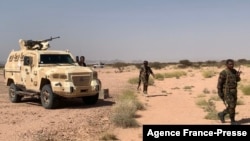In Yemen, the Saudi-led coalition and its Yemeni allies have captured all of the country's energy-rich Shabwa province. The development deals a blow to pro-Iranian Houthi rebels who control the country's capital, Sanaa, and much of the north of the country. Analysts say the victory gives the pro-Saudi coalition a way toward retaking parts of adjacent Marib province, which is also a major energy prize.
Arab media broadcast video of Saudi coalition forces and their Yemeni tribal allies on the ground advancing on desert areas of Marib province Tuesday, after capturing all of Shabwa province Monday.
Both the coalition and the Houthis have been vying for key parts of Marib for months.
Saudi coalition spokesman Colonel Turki al Maliki told a press conference in Riyadh Tuesday that "the battle to recapture Marib began at dawn Tuesday and is now continuing."
The Houthis reportedly have acknowledged in private that they lost Shabwa but have made no public statements.
Yemeni analyst Mohammed Qameim told Saudi-owned al-Arabiya TV that recent Saudi coalition airstrikes on Houthi forces and their weapons stockpiles have "degraded the Houthis’ military capabilities and pushed them back in Shabwa and Marib provinces."
The Saudi-backed government of exiled President Abed Rabbo Mansour Hadi controls the city of Marib, but the Houthis still hold other energy-rich regions of Marib province. The Houthis have repeatedly fired missiles and rockets into the city, killing and wounding scores of civilians.
Middle East analyst Paul Sullivan of the Atlantic Council told VOA that the Saudi coalition's victory in Shabwa means that it now "controls a large percentage of the effective coastline in southern Yemen," and that this is a "building block for putting Yemen back together again."
Shabwa, he noted, "has significant oil and gas fields....as well as two ports for exporting energy." He added that its main port of Balhaf has a liquid natural gas facility.
Theodore Karasik, a Washington-based Gulf analyst, says there has been a serious increase in military and diplomatic activities in Yemen, being driven by the perception that the United States is not playing an active role in trying to resolve the conflict, leaving the stage open to other players.
"The perception in the region is that the U.S. is not being helpful with any kind of settlement (of the Yemen conflict) or helping the players achieve their strategic goals, so you see Russia and China and Iran beginning to enter into the negotiating picture in a much stronger way," Karasik said.
Officials from the United Arab Emirates, which is part of the Saudi coalition in Yemen, have visited China in recent days, while Iran's foreign minister was in Oman Monday to meet with a Houthi delegation.
Tehran supports the Houthis in Yemen militarily. The Houthis are reportedly seeking more weapons after Saudi coalition airstrikes destroyed various Houthi assets, including rockets, missiles and drones at Sanaa’s airport.

